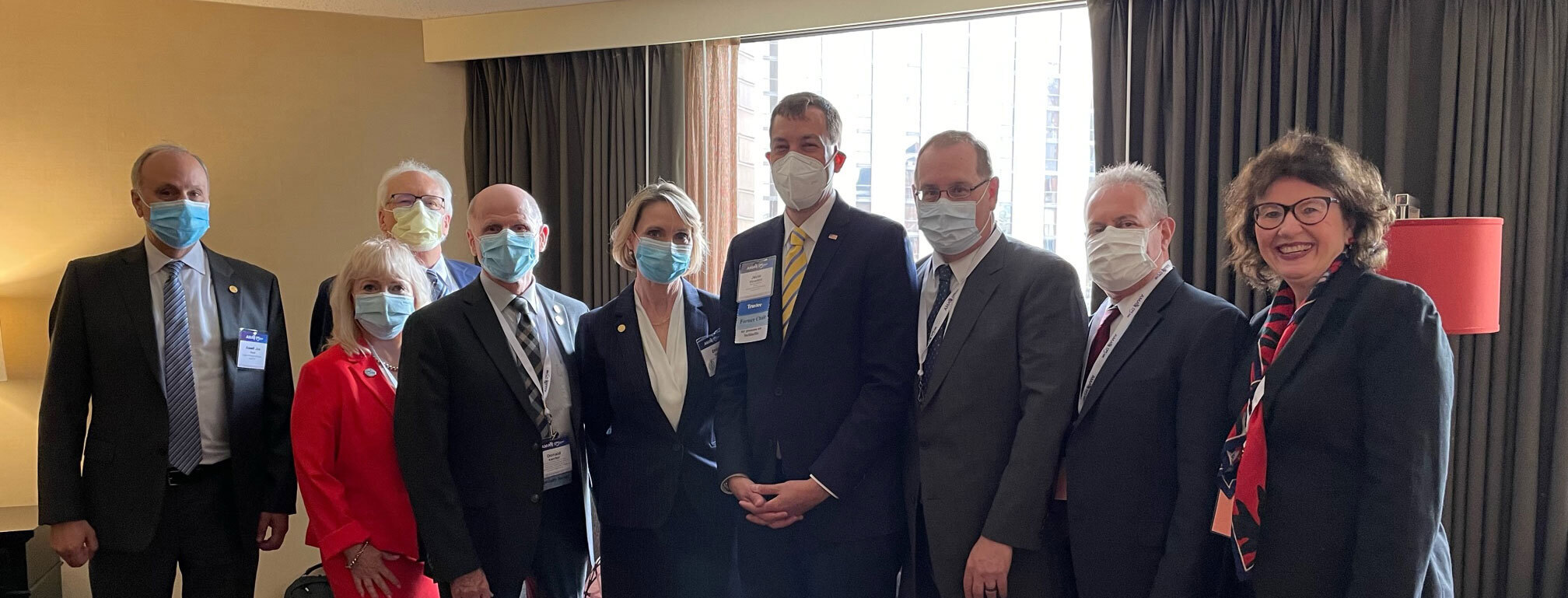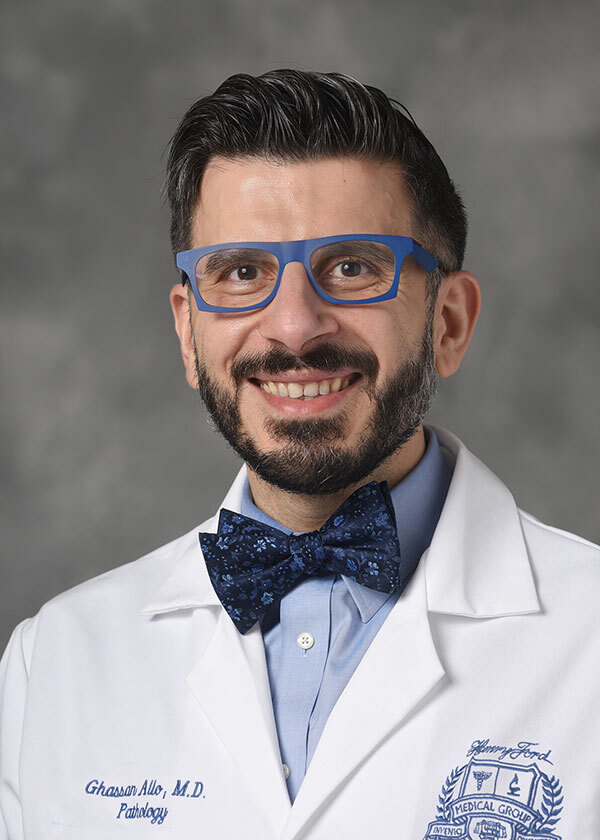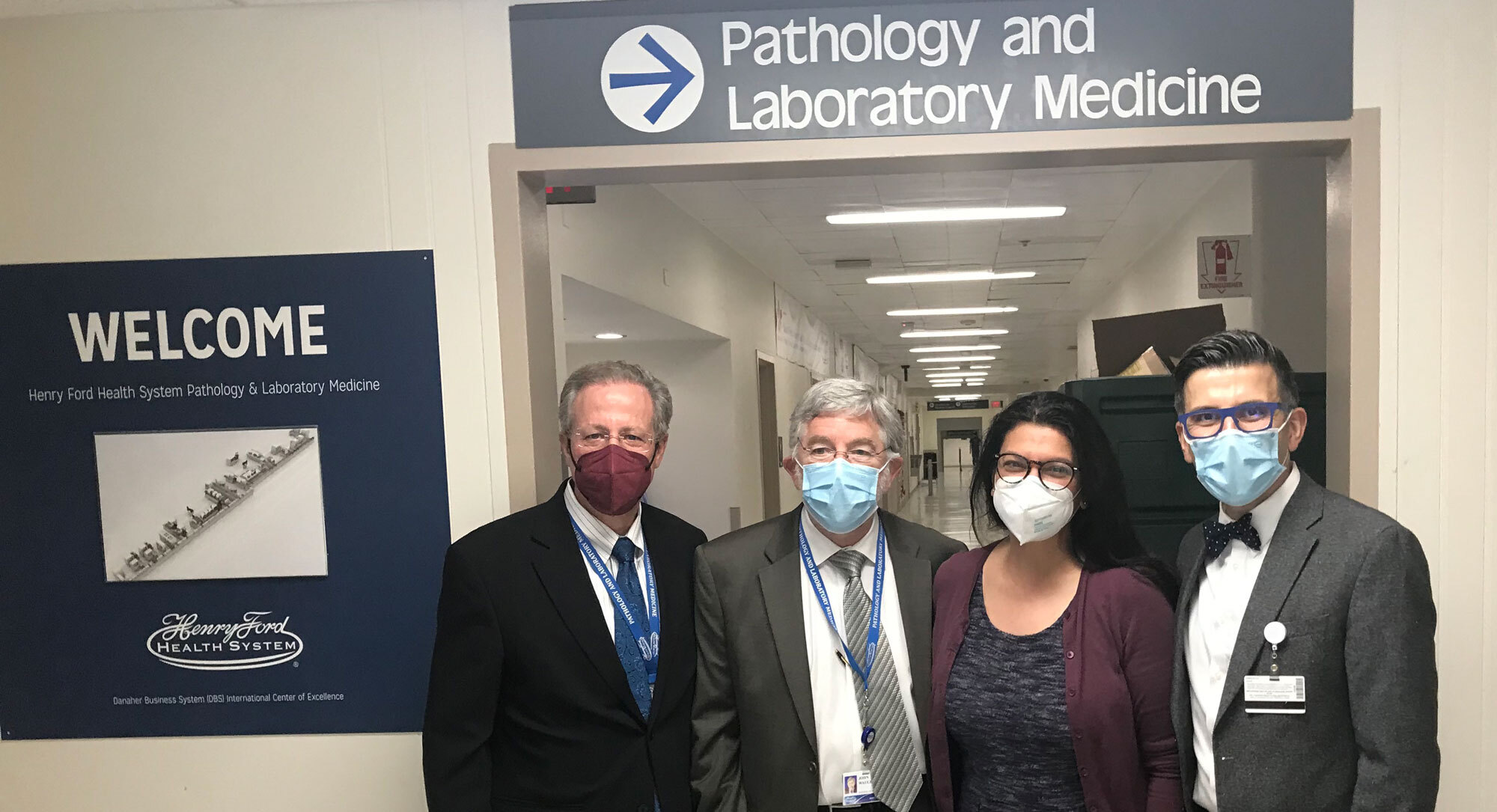- Home
- Advocacy
- Latest News and Practice Data
- June 15, 2022
June 15, 2022
In this Issue:
- Senate HELP Committee Advances VALID Act to Senate Floor
- CAP-Led Pathology Delegation at AMA 2022 Annual Meeting Urges Scope of Practice Changes, Mandatory Pathology Training
- CAP Joins in Call to Improve Diversity in Clinical Trials
- Dr. Allo: How You Can Champion Health Policy with Laboratory Tours
- Test Your CAP Advocacy Knowledge
Senate HELP Committee Advances VALID Act to Senate Floor
The Senate Committee on Health, Education, Labor, and Pensions (HELP) on June 14 approved a package of bills to reauthorize existing Food & Drug Administration (FDA) user fees and included new legislation (the VALID Act) which would authorize the FDA to regulate in vitro diagnostics (IVDs) including laboratory developed tests.
The HELP committee voted against including an amendment offered by Sen. Tommy Tuberville (R-AL) that would have exempted academic medical centers from the VALID Act. Committee members stated that the VALID Act already included several exemptions that all laboratories can utilize to reduce regulatory burden and that exempting some labs from regulation by the FDA established two different regulatory standards for laboratory developed tests.
One amendment accepted during the hearing would require the Government Accountability Office (GAO) to evaluate the effect of the VALID Act on hospital-based laboratories, laboratories serving academic medical centers, and other health care practitioners. The GAO would be due three years after enactment.
What is Next for the VALID Act
The FDA user fee bill, which includes the VALID Act, will now be brought up on the Senate floor for further consideration.
In the House of Representatives on June 8, representatives voted 392-28 on a separate FDA user fee legislation that did not include the VALID Act. If the Senate passes the HELP Committee’s version, the House and Senate would need to reconcile or find agreement on the two different bills before going to the president to be signed into law.
Key Facts of the VALID Act
In a letter to the HELP Committee on May 22, the CAP outlined several aspects of the VALID Act that the CAP supports. On May 27, the HELP Committee introduced the bill after reviewing comments from the CAP and other stakeholders.
Key facts include:
- Exempting all laboratory-developed tests currently in use from new regulatory oversight requirements through the VALID Act’s “grandfather” exemption.
- Laboratories may still introduce LDTs without undergoing premarket review between the VALID Act’s passage and October 1, 2027.
- The VALID Act would not be implemented for five years with an effective date of October 1, 2027, allowing ample time to further refine the regulatory framework.
- Requiring that the FDA to conduct public hearings one year from date of enactment and publish formal regulations which are subject to public comment within two years of enactment.
- Directing the FDA to avoid issuing or enforcing regulations or guidance that are duplicative of CLIA.
- Offering several exemptions from FDA pre-market review, including those LDTs that are low-risk, low volume, modified tests, manual tests, and humanitarian tests.
- Authorizing the FDA to collect user fees and establish a process by which the FDA must negotiate with the laboratory industry to set user fees, including future approval by Congress.
- Establishes mitigating measures, such as labeling, performance testing, and clinical studies, to shift higher-risk LDTs to lower tiers of regulation.
Additional information about this issue, including frequently asked questions, is available on the CAP’s website.
CAP-Led Pathology Delegation at AMA 2022 Annual Meeting Urges Scope of Practice Changes, Mandatory Pathology Training

The CAP led a delegation of pathologists at the annual 2022 American Medical Association (AMA) meeting and urged the House of Delegates (HOD) that physicians lead in practice teams, that pathology continues to be included in formal medical education training, fight for appropriate safeguards for consumer laboratory testing, and that private insurance companies reimburse physicians fairly. Recently CAP members encouraged legislators to increase Graduate Medical Education (GME) funding to increase residency slots, which is key to addressing critical shortages of pathologists in the coming years.
During the meeting, members of the CAP delegation provided written testimony on updating the medical student clinical standards. Because of that, the AMA agreed to work with the CAP on updating the clinical standards for pathology and laboratory medicine for medical student, residents.

The CAP supports physician-led health care teams and that the best interests of patients require that a physician member of the team directs the course of the diagnostic/therapeutic care of the patient and that a physician determine appropriate clinical/anatomic laboratory services. CAP President Dr. Volk testified at the reference committee hearing that health policy should replace the word “provider” with the word “physician” to avoid confusion on health care teams.
Similarly, the CAP holds that diagnostic laboratory testing should only be performed by those individuals who possess appropriate clinical education and training, under the supervision of licensed physicians, or are consistent with non-waived testing requirements under CLIA.
The CAP also urged the AMA to advocate for insurance plans to compensate physicians adequately. Insurance plans continue to revise policies that hinder patient access to pathology services through a lack of reasonable payment. During the resolution discussion, the CAP provided examples of private payer blanket policies threatening practices' financial viability.
The CAP urged the AMA to review issues with patient-directed self-service testing, including the accreditation and licensing of laboratories that sell self-ordered tests and physician liability related to non-physician-ordered tests. Jean Forsberg, MD, FCAP, asked the AMA to provide safeguards for patient-directed self-service laboratory testing.
The CAP also advocates for appropriate safeguards, such as state laws regulating such services should require direct access testing to be subjected to periodic proficiency testing consistent with the requirements for non-waived tests under CLIA. Patients are generally best served when laboratory tests are ordered by a qualified physician where such a physician directs the course of the patient's diagnostic and therapeutic care, and a physician should determine which clinical and anatomic laboratory services are appropriate.

During the meeting, outgoing AMA President Gerald E. Harmon, MD, urged in his opening address to stop unsafe scope-of-practice expansions for nonphysician health professionals. Dr. Harmon also made a passionate plea to end gun violence and urged lawmakers to enact common-sense gun laws.
Dr. Harmon also noted how the AMA, and other medical professional groups like the CAP, pressured Congress to pass legislation that staved off nearly 10% in Medicare payment cuts for physicians. “This was a major victory, but we shouldn’t have to suffer this annual cliffhanger,” Dr. Harmon declared.
The AMA HOD also voted the new AMA President-Elect Jesse M. Ehrenfeld, MD, who is the first LBGTQ person to be elected. Dr. Ehrenfeld is a senior associate dean, a tenured professor of anesthesiology, and a director at the Medical College of Wisconsin. He also is a professor of anesthesiology and health policy at Vanderbilt University.
CAP Joins in Call to Improve Diversity in Clinical Trials
The CAP has joined with 71 other organizations representing patients with chronic and acute health conditions to urge the Senate to take up critical provisions in the House Prescription Drug User Fee Act (PDUFA) reauthorization, which, if implemented, would improve diversity in clinical trials.
In a June 8 letter to ranking members on the Senate Committee on Health, Education, Labor & Pensions, the groups note that most clinical trials fail overwhelmingly to achieve diverse enrollment, even though many serious and chronic diseases disproportionately impact underrepresented racial and ethnic minority groups.
“This lack of diversity in trial enrollment inhibits a full understanding of how safe and effective new drugs might be across their intended populations,” they write. “It also exacerbates disparities in access to treatment when enrolling in a clinical trial may be a patient’s most effective treatment option.”
The groups note that the House has already advanced a legislative package that makes real and meaningful reforms to help ensure patients in every part of the country have access to the clinical trial care they need. They are calling on the Senate to address the following as part of the PDUFA reauthorization:
- Premarket reporting of diversity action plans to ensure enrollment of diverse populations.
- Evaluation of the need for additional post-market activities if trial sponsors fail to meet enrollment or diversity targets.
- Decentralized clinical trials and COVID-19 trial flexibilities that would allow certain trial services to be provided at community provider facilities.
- Public workshops to enhance clinical trial diversity by soliciting input from sponsors, manufacturers, patients, providers, and other stakeholders.
- Annual progress reporting by the Food and Drug Administration on how barriers to increasing diversity in clinical trials are being addressed.
- Improve outreach to underserved patients and providers by allocating federal resources for community health center grant programs that support hiring and training culturally competent onsite personnel to conduct and recruit for clinical trials.
- Minimize financial barriers to getting to a clinical trial location by ensuring federal rules allow sponsors to provide financial assistance to trial enrollees without the threat of liability.
“As America becomes more racially and ethnically diverse, a clinical trial system that fails to enroll patients from growing demographics will not support the pace of innovation that will help us meet the needs of patients with chronic and acute health needs,” the groups say in their letter. “We urge you to take real and meaningful steps towards this future by incorporating the critically important policies included in Title V of the House PDUFA reauthorization bill.”
Dr. Allo: How You Can Champion Health Policy with Laboratory Tours

Grassroots advocacy is at the root of driving change at the federal and state level on health care policies that will impact pathologists’ ability to practice and protects the patients they serve. The CAP’s grassroots network, PathNET, has over 800 volunteers who participate in grassroots activities to educate members of Congress and state legislatures on health care issues important to pathologists and the patients they serve. Recently, Dr. Ghassan Allo, MD, FCAP, a PathNET member, hosted Representative Rashida Tlaib (MI-D) for a laboratory tour at Henry Ford Health. Learn more about the PathNET program.
What drove you to get involved in advocacy?
The profound understanding that our specialty needs us drives me; as physicians and pathologists, we are best suited to represent and advocate for our specialty and our patients. It is our responsibility to leave our offices and educate legislators, the public, and the medical community on the importance of the complexity of what we do.
Do you have a favorite memory or experience that stands out in your advocacy work?
Grassroots advocacy is at the root of driving change at the federal and state level on health care policies that will impact pathologists’ ability to practice and protects the patients they serve. The CAP’s grassroots network, PathNET, has over 800 volunteers who participate in grassroots activities to educate members of Congress and state legislatures on health care issues important to pathologists and the patients they serve. Recently, Dr. Ghassan Allo, MD, MSc, FCAP, a PathNET member, hosted Representative Rashida Tlaib (MI-D) for a laboratory tour at Henry Ford Health. Learn more about the PathNET program.

What drove you to get involved in advocacy?
The profound understanding that our specialty needs us drives me; as physicians and pathologists, we are best suited to represent and advocate for our specialty and our patients. It is our responsibility to leave our offices and educate both legislators and members of the public, and the medical community on the importance of the complexity of what we do.
Do you have a favorite memory or experience that stands out in your advocacy work?
My favorite memory is from a recent lab visit by Congresswoman Rashida Tlaib visited my laboratory. She sat across from me on the microscope as I demonstrated to her real examples of diagnostic surgical pathology. I got to observe her curiosity and excitement as she saw “cancer,” answered her questions, and explained how as a pathologist, I could identify a hidden disease that would alter the complete course of this patient’s health care management. Rep. Tlaib was impressed that all pathologists she met in my department had a deep passion for what they did and for patient care despite the lack of direct patient contact.
What advice would you give your colleagues to be effective advocates?
Continue to be involved, even if that means just learning about major issues in pathology and how CAP is addressing them. Discuss what you have learned and accomplished with your colleagues. Attend the Pathologists Leadership Summit and actively participate in Hill Day. Sign up for PathNET to get updates on opportunities to be involved.
Are there any tips on conducting laboratory tours that you would like to share with your colleagues?
I was surprised to see the eagerness and amazement of lab guests to learn about all activities we run in the lab and how surgical or clinical specimens are dealt with after they are obtained. Some tips I would offer other pathologists:
- Be bold to ask members of Congress or staffers to visit – “You have not because you ask not.”
- Be ready – know all about your department; identify key areas and people to visit within your lab; research the visitors; meet with your institutional government affairs staff as they may have already interacted with your guests; reach out to CAP PAC and Grassroots specialists as they proved to be a great resource.
- Make it informative but fun and real: Guests were quite curious to learn what we did as pathologists. They were even more interested when you connect what you do, eg sitting behind a microscope with a piece of glass slide, to a real patient story with a relatable social or medical history.
Have you conducted a laboratory tour this year with a member of Congress or state legislator, and you want to share it with us? Submit your feedback here. Email PathNET@cap.org to learn how you can set up a laboratory tour.
Test Your CAP Advocacy Knowledge
Think you know CAP advocacy. Then take the June advocacy news quiz! Last month over 130 members took the quiz. See how you compare against your fellow CAP members and brag about your top scores on social!